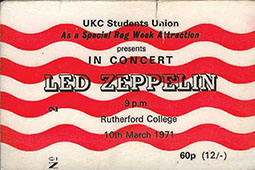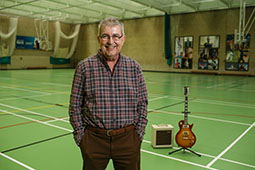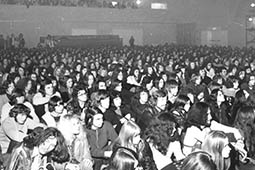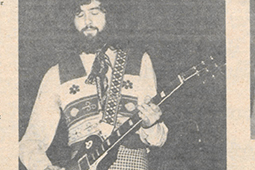By Peter Piddock, Eliot, 1968: English and American Literature
When early in 1971 Led Zeppelin announced that they were to tour small venues that spring, we were very keen to sign UKC up as part of that offer. Normally a band of that stature would have been beyond the Union’s means. Despite having promoted The Who in Eliot Dining Hall the previous summer, inflation in the music business was rampant and we had assumed that we would have to lower our sights somewhat in the coming months.
However, Led Zeppelin, despite having announced themselves on the world stage with their last two albums, both of which had gone to number one in the US charts, had announced this to be a tour of small venues at affordable prices. They were offering to play for 65% of the gate or 60p per head, whichever was the larger sum; ticket prices were capped at 60p. This was a win/win situation for us, ensuring that we couldn’t lose money on the deal.
A meeting between myself and Peter Grant, the band’s manager was arranged. Happily, he agreed to the band playing in Rutherford Dining Hall as part of the spring tour. One thousand tickets – our normal quota for a dining hall – were printed and went on sale. The queue snaked all the way from the Union office around Eliot College and we sold out in a matter of hours. Everything was hunky dory, or so we thought!
A few days later we had a phone call from Canterbury Fire Station. I think they had heard that a major artist was to play at UKC and they decided a fire inspection was necessary. I should add at this point that during my tenure at the University I was unaware of any stipulations on maximum attendance for any of the various venues we used for gigs. Fire Officers duly arrived and carried out what we thought would be a routine inspection; but to our horror, they announced that the maximum number of tickets we could sell was 600 – not the 1000 we had already sold!
This left us in a bit of a quandary. We had signed a contract with the band based on 1000 tickets. We were committed to paying them £650, being the larger alternative figure. As we were to discover over the next few weeks, Led Zeppelin’s management team, fronted by manager Peter Grant and ably assisted by tour manager Richard Cole, were an intimidating prospect for any 20-year-old student entering into negotiations. As the band’s management were intransigent on the terms of the contract, we faced two alternatives. Either we cancelled the concert completely, risking the wrath of ticket holders, and being sued by the band for contractual breach, or we found an alternative venue in the Canterbury area with a legal capacity of at least 1000.
Realistically we faced the prospect of looking off campus. The Marlowe Theatre sprang to mind immediately. However, in 1970 the theatre was in The Friars and had a much smaller seating capacity of around 700, rather than today’s 1400. We were only left with one alternative – the Odeon Cinema – which did have an audience capacity of 1000. I approached the manager and explained our situation to him; he initially seemed optimistic. The following week I received an official letter from him. Rather than the expected contract, to my dismay he regretted that his area manager had vetoed the plan as being too much trouble for the potential profit involved.
We were now no more than two weeks away from the advertised date of the concert, and matters were now getting seriously worrying. I was stalling tour manager Richard Cole’s site inspection and worse still, we had now heard through the grapevine that various Medway biker gangs, having failed to buy tickets for the concert, were now planning to gate-crash the event.
A small ad hoc committee was empowered by the Union to act executively as we saw fit to try and find a satisfactory solution, consisting of myself, Union Treasurer Peter Anwyl and two other members. We decided on a two-pronged approach.
Firstly we contacted Jo Grimond, ex leader of the Liberal Party and candidate for the Chancellorship of the University. Being a politician, his contact book might be useful, and sure enough, he told us that he was on good terms with John Davis, the chairman of The Rank Organisation, parent company to Odeon Cinemas. A phone call was duly made and he informed us that John Davis would see us at Rank’s head office to make our case for
utilising the Odeon cinema in Canterbury.
We presently attended the meeting and I think we eloquently made our case. We’d had a fair bit of practice by now, after all. He said that he would make enquiries and give us an answer in 24 hours. I was asked to phone his secretary at 4.00pm the following day. I made the call from the Union office. John Davis was charm personified and he explained that although he could see no reason why the concert couldn’t have taken place at the Odeon, he couldn’t undermine the authority of one of his middle managers by overturning his decision.
There was now only one week to the advertised date of the gig. Led Zeppelin’s management wrote and informed us we had 48 hours to come up with an appropriate venue or face cancellation and a lawsuit.
So we turned to our alternative option; this approach would prove to be more radical as it involved an element of shall we say…blackmail!

There was only one building on campus large enough to host the concert – the recently built pride of the sports community – the Sports Hall. It was certainly not ideal for music concerts, being akin to an aircraft hangar, with hard reflective surfaces and veryexpensive wooden sprung floor. It was the jealous preserve of the various sports clubs and associations that used it. I think we would have considered it more likely that we could promote Led Zeppelin at Westminster Abbey than the UKC Sports Hall!
We requested an audience with the University Senate Committee, who by now had heard that there may be an issue with the concert. The rumour machine had been working overtime. We explained the situation in full, detailing our various efforts to find an alternative venue. We explained that we would have to cancel the event and take the legal consequences, as well as refunding all gate money. We revealed our intelligence that biker gangs, some 400 strong, were expected to try and gatecrash a cancelled concert, and that while we could inform ticket holders on campus of the cancellation, there was no way we could get information to the Medway area in time. This was, after all, long before the internet and social media.
We explained to the Senate Committee that the simple fact was that we couldn’t guarantee the safety and security of the campus if the concert were not to proceed as planned, and that the Sports Hall was the only remaining option.
As you might imagine, this caused quite a stir. The memory of the mod and rockers clashes at British seaside towns a few years earlier were still fresh in the memory, and the idea of 400 bikers marauding
across the campus looking for retribution wasn’t a concept that sat easily with academics, nor us students to be honest – even if we might have been guilty of ever so slightly exaggerating the risk!
After consulting the Sports Hall management, the Senate Committee took a surprisingly short time to accede to our request. Two stipulations were made: that we cover the existing sprung floor with a false floor as protection, and that we ensure security for the concert. With little or no idea how this could be accomplished, we accepted the deal, with a considerable, collective sigh of relief.
The next day I informed Peter Grant that we had a venue, and he dispatched Richard Cole on a recce. We had six days left and the clock was ticking. As the recce progressed the next day, I realised the enormity of the task that faced us. We would have to build a stage for the performance, we would need a basic scaffold rig above the stage for some lights and at least two lighting towers for frontal spots, plus another raised dais for the band’s sound engineers to mix the audio. In addition, Richard Cole insisted that black drapes be hung around the perimeter to prevent too much audio bouncing off the hard walls, and suitable areas be furnished as a band dressing room. On top of all that we had to re-floor the entire hall!
Manpower would be needed and we put out a campus-wide appeal for volunteers to become our stage crew, with the only reward being free admission to the gig. Before too long we had a team of about 40 volunteers co-opted. I cannot praise this team too highly; it was through their extraordinary hard work and dedication that the concert eventually took place.
With two days to go, we were almost ready. However I was getting a little concerned that the hall was so cavernous that even with an audience of a 1000 there would be a lack of atmosphere. Why not get the Fire Brigade back in for an inspection and who knows? The day before the concert, fire officers came and had a look at our handiwork. Imagine our delight when they not only signed off everything we had done, they authorised the capacity of the venue at 1400. We could sell another 400 tickets!
We still however had one major stipulation made by the Senate Committee to meet: security. This was not an area of expertise that sat easily on the shoulders of a longhaired radical student in those years. The only security team in the area that I could think of were the Dreamland team at Margate, responsible for policing the slot machines and arcades of that august establishment.
Surprisingly, their team of ten burly guys in red dinner jackets were available at a fairly reasonable hourly rate – I suspect out of curiosity on their part at such a strange assignment – protecting a lot of longhaired students and a band they had probably never heard of! They were duly assigned positions at the entrance doors and between the band dressing room and the auditorium.
The big day finally came, and we could barely believe it, but everything was ready and in place. The band arrived with their entourage that afternoon, the sound check passed muster with Richard Cole, the audience took their place suitably refreshed from the bar, and with a considerable sigh of relief I took to the stage at 9.00pm to announce the band. “Ladies and gentlemen, welcome to the University of Kent. It is with great pleasure that we welcome on stage one of the greatest rock bands in the world – Led Zeppelin!”
A smattering of applause and…nothing. Still nothing, and in the five minutes it took me to work my way to rear of the auditorium, still nothing. Although now there was a noticeable buzz of disquiet from the crowd.
If you have read the reviews of the concert both by Incant, the student newspaper, and Melody Maker, that august music journal, both of which appear on ledzeppelin.com, then you will know the band’s performance was
fairly average. There was a degree of scepticism about rock mega stars among students, and Led Zep’s reputation preceded them. The slow start to the concert certainly didn’t help, although admittedly by the end of the gig the audience was on its feet as collective whole, and the joint was rocking.
What neither reviewer knew was the reason for the slow start. As I eventually reached the rear of the auditorium and passed through towards the band’s dressing room, I was met by an extraordinary sight. The band, using the ample sized manager Peter Grant as a battering ram, were trying to push their way past a phalanx of Dreamland bouncers, a thin red line in their dinner jackets. The thin red line was holding.
It transpired I had neglected to inform the security team of one essential piece of information – that the four longhaired blokes trying to gate-crash the rear of the auditorium were in fact the band, and although on occasions he might have passed muster, Peter Grant was not a member of a Medway biker gang! I hastily informed security of their faux pas, apologised profusely to the band, who bless them, actually saw the funny side of the situation, and the show went on, albeit with a now somewhat lukewarm audience.
I can’t actually remember too much of that evening. I was just so relieved that weeks of non-stop tension and worry were now at an end, I imbibed fairly heavily. The following morning the nagging cough that had dogged me for several days turned out to be pneumonia. I was admitted to the sanatorium where I remained on my back for two weeks.
No wonder I only got a 2:2 that summer! But would I have missed the experience… of course not!
Were you there? Share your memories and any photos of the gig with us via alumni@kent.ac.uk
If you would like to read more stories from the latest edition of Kent magazine click here: https://issuu.com/universityofkent/docs/bt_127460_kent_mag_autumn2018_final



